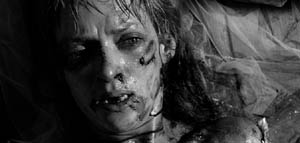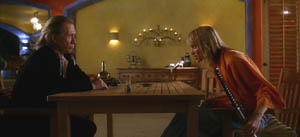|
For the purpose of this review, I'm treating Kill Bill volumes one and two as a single film, since that's how Tarantino shot them. So let's get started. 
As I was walking out of the theater, I heard a guy commenting to a friend that "Tarantino finally did a film about women," which I thought was an interesting take. It's certainly true that his previous films have been largely about the whole "guy thing," which is only fair. Tarantino is a guy, and as they say, you write what you know. Even Jackie Brown, with its female protagonist, isn't really about the female condition, and Kill Bill definitely ventures into that territory. As to how successfully he manages it, I can't totally say, since I'm also a guy, and like him, can only make a best guess. But my best guess is that he pulls it off well. Indeed, it's a testament to Tarantino's strength as a filmmaker that he makes so much out of what is essentially a very simple story. Kill Bill is the tale of a pregnant and retired female assassin whose former boss and uhhm, partner (that would be Bill) takes a dim view of her sudden decision to marry a regular guy and shoots her in the head, leaves her for dead, 'wink wink wink' was what he said. Only she doesn't die, and emerging from her coma five years later, decides to settle a few lingering issues with Bill and his squad of professional killers, who had seriously whacked her whole wedding party with some pretty extreme prejudice. It seems like a rather straightforward revenge flick, albeit a revenge flick told out of linear order, as is Tarantino's wont. For a long stretch, it remains mostly an action-oriented story, though considering that the total film is around four hours long, it's quite possible for it to hang about in one groove for a good while without it becoming the whole picture. All of the excesses he had reined in for Jackie Brown get set loose again, with cartoonishly overblown action and melodrama, as well as a few hundred thousand million gallons of blood spraying about like a herd of incontinent fire hoses out to paint the town red. But while the movie begins with broad strokes, it gradually narrows to the more personal and subdued approach he lends to the final act of the film, reminding us again why he's so darn good at what he does: not only can he do action, he can do really great characters, which is far more challenging. For not ever having been much of an action star previously, Uma Thurman, who's no less hot for crossing the thirty-year mark, seems honestly and truly dangerous as all hell. The fight scenes are fast, kinetic and often eye-defying in their complexity, taking the older and better approach of making fast action actually fast instead of dragging it down with a lot of digital mucking about and bullet time-ish crapola. The sequence wherein Thurman's long-unnamed Bride takes on a couple dozen sword-wielding bodyguards and dices them into several more dozen hemmoraging chunks kicks ass all over anything in The Matrix, though for sheer visual delight, it's hard to top her training sequence from volume 2. Quentin's obvious love of low-rent kung-fu action flicks sees that scene not only shot on washed-out, grainy film stock, but full of zippy and awkward zooms and excessive swooshy foley on everything that moves. It's probably the most fun part of the story simply for how perfectly he nails the style of '70s chopsocky, but it's the less-is-more "Grave of Paula Schultz" chapter that's most memorable in the end, the riskiest and most unnerving thing Tarantino's done since the infamous "ear" sequence in Reservoir Dogs, albeit for very different reasons.  Despite all the swordplay and hand-to-hand, however, Kill Bill isn't simply a kung-fu film writ large. In a kung-fu film, the fights get progressively bigger and longer until the inevitable confrontation with the main baddy. Here, the most elaborate fight scene occurs halfway though the story, at the end of volume 1. As with Jules in Pulp Fiction, Tarantino, while obviously a fan of such character types, doesn't shy away from plainly dissecting the somewhat questionable morals of his heroine, justified be her revenge or not. He also doesn't pronounce judgement on her for being who she is, leaving it up to the audience to decide whether or not to sympathize with her plight. I wish more directors could follow his example, as there's nothing more annoying that having a film tell you how you're supposed to feel about it. Nothing, I mean, other than having a sock full of rockfish. That sucks. Like most successful entertainers, Tarantino has his share of detractors, who, when they aren't complaining about the violence and morally ambiguous characters, are falling over each other in a rush to point out that his ideas are all borrowed from other sources and label his films "painfully postmodern" and such. Half of these critics seem almost more concerned with the man's audience than they are with the actual movies themselves, dubbing the fans a cultish following whose admiration is incapable of dipping regardless of product quality. This curious ability to divine the attitudes of countless scores of individuals the critic has never met and will never meet is as laughably absurd as it is unture-one might've said the same sorts of things about George Lucas prior to Star Wars episodes I and II, which caused a lot of self-pruning amongst his own rabid fan base. Tarantino gets the recurring accolades because he knows how to entertain people, not because of a lot of over-discussed filmic tropes the average moviegoer has never even heard of anyway. When I see a spot-on mimicry of a kung-fu film in the middle of Kill Bill, I don't see some pretentious attempt at making an intellectualized comment on kung-fu films. I see a guy who obviously actually likes kung-fu films having a lot of fun making one (or at least part of one) himself. Like all his prior works, this is a big conbobulation of everything Tarantino likes to see in movies, and it does little good to try and overthink the process. Quit putting the spyglass to every angle or line of dialogue and just loosen up and have some fun, because I guaran-damn-tee you, that's what Quentin's doing. -review by Matt Murray
|
|
||||||||